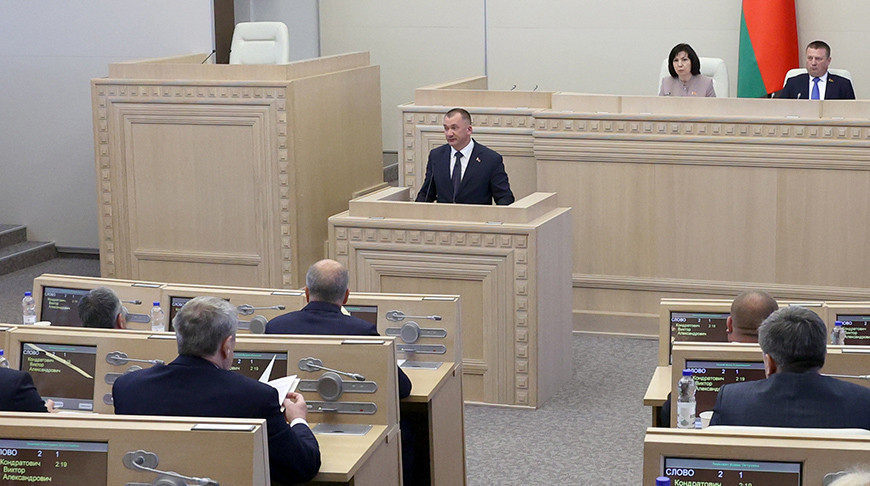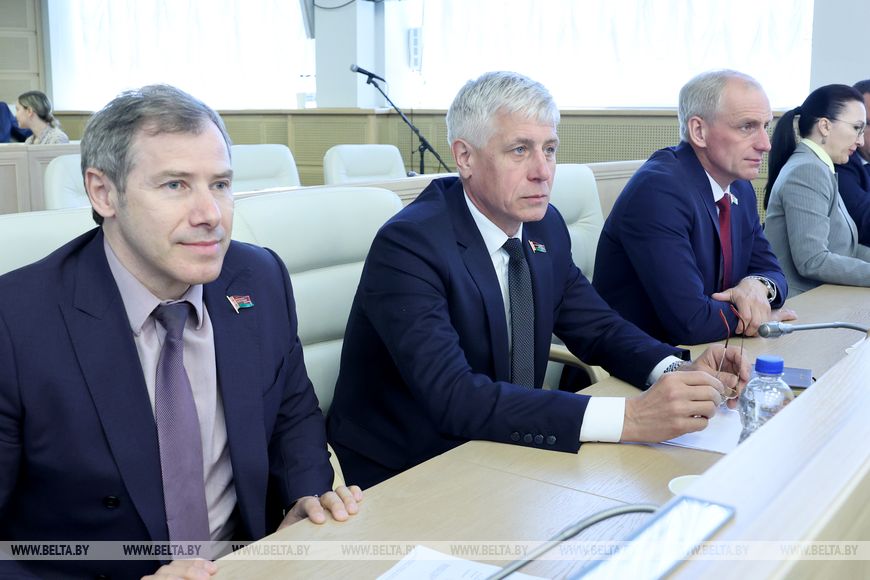
MINSK, 2 May (BelTA) — Belarusian Internal Affairs Minister Ivan Kubrakov spoke about the innovations of the amnesty bill in connection with the 80th anniversary of Victory in the Great Patriotic War. The Council of the Republic of the National Assembly of the eighth convocation passed the bill on 2 May, BelTA has learned.
Ivan Kubrakov presented the document at the meeting. The minister emphasized that the bill was developed following the instructions of the president of the Republic of Belarus to mark the 80th anniversary of the Victory in the Great Patriotic War. “The current bill proposes to retain the principles and approaches enshrined in the previous law on amnesty, which was implemented on 3 January 2025,” he said. “The applied approaches have positively proved themselves in practice and did not affect the crime rate in the country.”
“Thus, to certain convicted persons who are not in places of imprisonment, amnesty will be applied only if they work or study. Persons sentenced to restriction of freedom will be released conditionally, and those convicted to imprisonment will get a milder punishment. The document also proposes to reduce the sentence by one year for women and single men with children under the age of 18 who have not been deprived of parental rights, as well as for persons who committed crimes related to illicit trafficking of narcotic drugs when they were minors; for women with many children, with three or more children under the age of 18 who have not been deprived of parental rights, who have been convicted of committing murder or causing serious bodily harm resulting in death without aggravating features; for persons who have committed corrupt practices; and for persons who have been convicted of corruption,” the minister said.

As for the novelties, the bill suggests replacing imprisonment with a more lenient punishment to previously unconvicted persons who have reached the age of 70. “There are 11 such persons in prisons. This approach will not apply to persons who have committed crimes involving the infliction of serious bodily injury, attempt on human life or resulting in the death of a person, extremist crimes,” the minister added. “There is also a proposal to reduce the sentence by one year for previously unconvicted persons who have committed crimes related to illicit trafficking of narcotic drugs. This norm will not apply to persons who have committed drug offenses resulting in the death of a person.”
“Traditionally, the amnesty law will be applied only to persons with a good behavior record and fully compensated for the damage caused by the crime. In total, the amnesty is expected to be applied to almost 8,000 convicts. Plans are in place to pardon about 4,000 convicts, and reduce the sentence by one year for another 4,000 convicts,” said Ivan Kubrakov. “Articles 1-9 of the draft law provide for exemption from certain types of punishment for certain categories of persons who have committed crimes and who do not pose a great social danger or committed less serious crimes. There are 620 such persons. These are minors, pregnant women, women and single men with children under the age of 18, persons of retirement age, persons with disabilities, patients with tuberculosis, oncological diseases and HIV-infected, citizens who suffered from the Chernobyl nuclear accident, persons who received wounds, injuries, diseases in the performance of duties during service in paramilitary organizations.”
Part 1 of Article 13 of the draft law establishes conditions and types of crimes when amnesty is not applied. Amnesty will not apply to persons who were granted amnesty or pardon in 2022-2025 and who have committed a deliberate crime again during the period of unexpunged or unspent convictions; who have not fully compensated for the harm (damage) caused by crimes, who have not reimbursed arrears of alimony or expenses for the maintenance of children, who have maliciously violated the established order while serving their sentence, who have committed especially dangerous repeated offenses, who have been involved in extremist or terrorist activities. The bill also provides for the procedure for assisting amnestees in employment and domestic arrangements.
“The adoption of this law and its implementation will not have a negative impact on the country’s crime rate and will not entail the allocation of additional funds from the national budget,” Ivan Kubrakov added.
Ivan Kubrakov presented the document at the meeting. The minister emphasized that the bill was developed following the instructions of the president of the Republic of Belarus to mark the 80th anniversary of the Victory in the Great Patriotic War. “The current bill proposes to retain the principles and approaches enshrined in the previous law on amnesty, which was implemented on 3 January 2025,” he said. “The applied approaches have positively proved themselves in practice and did not affect the crime rate in the country.”
“Thus, to certain convicted persons who are not in places of imprisonment, amnesty will be applied only if they work or study. Persons sentenced to restriction of freedom will be released conditionally, and those convicted to imprisonment will get a milder punishment. The document also proposes to reduce the sentence by one year for women and single men with children under the age of 18 who have not been deprived of parental rights, as well as for persons who committed crimes related to illicit trafficking of narcotic drugs when they were minors; for women with many children, with three or more children under the age of 18 who have not been deprived of parental rights, who have been convicted of committing murder or causing serious bodily harm resulting in death without aggravating features; for persons who have committed corrupt practices; and for persons who have been convicted of corruption,” the minister said.

As for the novelties, the bill suggests replacing imprisonment with a more lenient punishment to previously unconvicted persons who have reached the age of 70. “There are 11 such persons in prisons. This approach will not apply to persons who have committed crimes involving the infliction of serious bodily injury, attempt on human life or resulting in the death of a person, extremist crimes,” the minister added. “There is also a proposal to reduce the sentence by one year for previously unconvicted persons who have committed crimes related to illicit trafficking of narcotic drugs. This norm will not apply to persons who have committed drug offenses resulting in the death of a person.”
“Traditionally, the amnesty law will be applied only to persons with a good behavior record and fully compensated for the damage caused by the crime. In total, the amnesty is expected to be applied to almost 8,000 convicts. Plans are in place to pardon about 4,000 convicts, and reduce the sentence by one year for another 4,000 convicts,” said Ivan Kubrakov. “Articles 1-9 of the draft law provide for exemption from certain types of punishment for certain categories of persons who have committed crimes and who do not pose a great social danger or committed less serious crimes. There are 620 such persons. These are minors, pregnant women, women and single men with children under the age of 18, persons of retirement age, persons with disabilities, patients with tuberculosis, oncological diseases and HIV-infected, citizens who suffered from the Chernobyl nuclear accident, persons who received wounds, injuries, diseases in the performance of duties during service in paramilitary organizations.”
Part 1 of Article 13 of the draft law establishes conditions and types of crimes when amnesty is not applied. Amnesty will not apply to persons who were granted amnesty or pardon in 2022-2025 and who have committed a deliberate crime again during the period of unexpunged or unspent convictions; who have not fully compensated for the harm (damage) caused by crimes, who have not reimbursed arrears of alimony or expenses for the maintenance of children, who have maliciously violated the established order while serving their sentence, who have committed especially dangerous repeated offenses, who have been involved in extremist or terrorist activities. The bill also provides for the procedure for assisting amnestees in employment and domestic arrangements.
“The adoption of this law and its implementation will not have a negative impact on the country’s crime rate and will not entail the allocation of additional funds from the national budget,” Ivan Kubrakov added.













